The Dobbs decision by the U.S. Supreme Court was a watershed moment in women’s reproductive health care. Dobbs’ elimination of the federal constitutional protection for abortion allowed states to ban and criminalize abortion and to prosecute doctors who provide abortion procedures or prescribe medication abortion, along with those who assist them. But eviscerating the federal constitutional right to terminate a pregnancy and ceding the power to the vagaries and inconsistencies of state legislatures does not, as asserted by the Supreme Court’s majority in Dobbs, make the abortion issue more “workable.” This argument is not original but one long deployed by abortion opponents against Roe v. Wade and Planned Parenthood of Southeastern Pennsylvania v. Casey.
Roe had established a trimester framework that governed when a woman had the sole discretion to terminate her pregnancy, when states could regulate abortion procedures in the interest of protecting the pregnant woman’s health, and when states could outlaw abortions in the interest of protecting potential life. Casey affirmed Roe’s central holding that a woman had a right to terminate her pregnancy pre-viability but rejected Roe’s trimester framework, instead holding that state statutes or regulations having the purpose or effect of restricting abortions pre-viability could not impose an “undue burden” on a woman seeking an abortion of a non-viable fetus. In Dobbs, the majority argued that Roe and Casey burdened courts with “an unwieldy and inappropriate task” and that continued reliance on the undue burden standard “would undermine, not advance, the ‘evenhanded, predictable, and consistent development of legal principles.’”
Far from making things simpler, the Dobbs decision complicated the legal landscape for courts, women, and health care providers as states across the country disagree over whether and under what circumstances abortion is legal. In “The New Abortion Battleground,” an article first posted online in February 2022, a group of legal scholars joined in explaining how what was once a “uniform national right [to terminate a pregnancy] has become a state-by-state patchwork” and forecast a post-Roe world where “states will attempt to impose their local abortion policies as widely as possible, even across state lines and will battle one another over these choices.”
Early manifestations of these state battles include a 2021 attempt by Missouri legislators to enforce that state’s abortion restrictions on out-of-state procedures provided to Missouri citizens and a 2022 attempt to impose civil liability on those who assist Missouri citizens in traveling out of state to obtain an abortion. In 2024, voters approved an amendment to the Missouri Constitution to protect reproductive freedom. (As of this writing, abortion is legal in Missouri up until the point of fetal viability.) Interstate travel for abortions has also been targeted in Texas, with a number of Texas counties passing ordinances that ban people from helping others to travel to obtain abortions. And in Alabama, State Attorney General Steve Marshall threatened that felony charges could be brought against anyone who assisted an Alabama resident in accessing out-of-state abortion care. (A 2023 lawsuit by health care providers yielded a ruling by a federal district court in Alabama that such state action would violate federal constitutional rights to travel and free speech.)
Conversely, abortion-protective states, including Massachusetts, California, Connecticut, Delaware, New Jersey, New York, Pennsylvania, and Illinois (among others) have either passed laws or their governors have issued executive orders with the goal of preventing anti-abortion states from extending their restrictive laws to abortions in their protective states. Moreover, in some instances, these laws operate to shield providers in protective states who treat out-of-state patients via telehealth and prescribe medication abortion from such out-of-state restrictions, regardless of where the patient ingests the medication.
In the almost three years since the U.S. Supreme Court issued the Dobbs decision, the state abortion wars are readily underway as states test their ability to extend their preferred abortion laws and policies beyond their own state borders. Now that Roe is no longer the law of the land, anti-abortion states are emboldened to try and enforce their laws against those from abortion-protective states that provide abortion care to residents of anti-abortion states. Meanwhile, abortion-protective states are committed to shielding their health care providers from out-of-state prosecutions and lawsuits.
A poignant example of this dynamic pits Louisiana against New York. In January 2025, Tony Clayton, the district attorney (DA) for the 18th Judicial District of Louisiana, indicted a New York doctor, Margaret Carpenter, and the mother of a pregnant minor for “knowingly causing an abortion ‘by means of delivering, dispensing, distributing, or providing’ a pregnant woman with an ‘abortion-inducting drug.’” New York had prepared to protect clinicians like Dr. Carpenter by passing a shield law that, among other things, broadly prohibits New York law enforcement and other New York state officials from cooperating with investigations or arresting or extraditing anyone “in connection with providing, facilitating, or receiving protected health care in New York.” With respect to reproductive health care, the protections are intended to apply “even if the care was provided via telehealth to a patient located out-of-state, so long as the provider was physically present in New York.”
The Louisiana prosecution follows a civil suit brought by Texas Attorney General Ken Paxton against the same doctor in New York for allegedly prescribing and mailing medication abortion to a patient in Texas. In February, a Texas judge entered a default judgment ordering Dr. Carpenter to pay at least $100,000 in fines for failing to respond to the lawsuit. In March, the acting county clerk informed Paxton that the Ulster County Clerk’s Office would not be filing Texas’ summary judgment against Dr. Carpenter in accordance with New York’s shield law. New York Attorney General Letitia James commended the actions of the clerk, indicating that he had followed the law.
But this may not be the end of the case. Texas could challenge whether the New York shield law violates the federal Constitution. If the case eventually reaches the Supreme Court, the outcome will likely depend on how the Court interprets an exception to the Constitution’s full faith and credit clause. While courts normally, under the federal full faith and credit clause, give an out-of-state judgment the same effect it would have in the issuing state, courts have not found such an obligation to enforce the “penal judgments” of other states.
What counts as a penal judgment? As Professor Mary Zeigler explains, “[t]he central question is whether a suit is meant ‘to punish an offense against the public justice of the State’ rather than ‘to afford a private remedy to a person injured by the wrongful act.’” Zeigler notes that this definition seems to encompass state criminal convictions and that courts have also held “money awarded to a state in a civil action would qualify” as a penal judgment. In this suit, “Texas won a judgment in a bid to enforce its penal laws (including an abortion ban that prescribes criminal punishments).” So the default judgment against Capenter “appears to be a prime example” of a penal judgment, thus falling outside the requirement of the full faith and credit clause that another state give it effect, but Zeigler cautions that the Supreme Court “has expressed skepticism about the penal judgment exception in the past, and the justices in the current conservative supermajority have been willing to discard decades-old precedents when it suits them.”
The Louisiana prosecution raises the stakes in the state abortion wars even beyond the Texas default judgment because Louisiana is the first publicized prosecution following Dobbs, where one state has indicted a doctor in another state for alleged actions the doctor undertook in that other state, where she is licensed and where the actions are legal. It places health care providers like Dr. Carpenter, who would provide medication abortion prescriptions via telehealth to patients located in Louisiana, in some degree of criminal risk. But the law of extradition, bolstered by New York’s shield law, provides some offset to the intended chilling effect of Louisiana’s attempted extraterritorial application of its criminal laws to other health care providers who provide similar care.
The Louisiana prosecution, the extraterritoriality of state criminal law, and the law of extradition
Louisiana generally prohibits abortion at all stages of pregnancy through a trigger law, the Human Life Protection Act, that was activated when Roe fell. The trigger law contains an exception for a licensed physician to “perform a medical procedure,” which would include administering medication abortion, when “necessary … to prevent the death or substantial risk of death due to a physical condition, or to prevent the serious, permanent impairment of a life-sustaining organ of a pregnant woman.” Dr. Carpenter, however, was charged under a different Louisiana law titled “Criminal abortion by means of abortion inducing drugs,” which makes it unlawful to “knowingly cause an abortion to occur by means of delivering, dispensing, distributing, or providing a pregnant woman with an abortion-inducing drug.” Louisiana specifically targets out-of-state telehealth providers through this law insofar as it exempts only physicians “licensed by the state of Louisiana who administe[r] the abortion-inducing drug in person to the pregnant woman.” (But this law also prevents Louisiana physicians from using the exemption as a “defense against prosecution under any other provision of law that makes the abortion unlawful.”)
Although specific details about the Louisiana prosecution of Dr. Carpenter have been limited, and press reports about the case have not linked the indictment, a Health Law Alliance provider alert indicates that the “indictment against Dr. Carpenter centers on an April 2024 telehealth consultation, where she allegedly prescribed mifepristone and misoprostol [the two-drug regime approved by the FDA for terminating a pregnancy up to 10 weeks] to a Louisiana resident who sought the medications for her daughter,” which presents the narrow circumstance where a third person in Louisiana is allegedly involved. DA Clayton stated in a radio interview that the relevant activity also involved Dr. Carpenter’s mailing to Louisiana the pills that allegedly caused the minor’s abortion in that state.
From facts available via public reporting, the Louisiana prosecution thus appears to involve an extraterritorial application of state criminal law to an individual acting outside of Louisiana, lawfully under the laws of the state where the individual acted, but whose actions allegedly caused a result—an abortion—in Louisiana that was unlawful under that state’s laws. (The Governor of Louisiana signed an extradition warrant suggesting Dr. Carpenter was in Louisiana when the alleged criminal activity occurred and then fled from Louisiana, but this analysis proceeds under the assumption she was in New York, which is consistent with media accounts.)
It is not unusual for states to claim legislatively the ability to exercise extraterritorial jurisdiction over individuals located in other states who are alleged to have violated the laws of that first state. As Professor Darryl K. Brown explains, Section 1.03 of the Model Penal Code (MPC), which several states have used as a basis for enacting statutes that provide extraterritorial jurisdiction, reflects a consensus by the MPC drafters and the adopting state legislatures of different circumstances where it is presumably constitutional to “extend the ambit of state criminal law to persons and conduct outside the state.” One circumstance identified in the MPC states that “a person may be convicted under the law of this State of an offense committed by his own conduct … if … either the conduct which is an element of the offense or the result which is such an element occurs within this State.”
Consider, for example, a person physically present in New York who sends a package containing an explosive device to someone in Louisiana, thereby murdering the Louisiana resident. In this scenario, Louisiana could seek to charge the New York resident with murder under Louisiana law. This extraterritorial application of Louisiana law, which involves an assertion of jurisdiction over out-of-state conduct that is an element of the offense or results in an element of the offense that occurs within Louisiana, and any subsequent extradition by New York would likely not be controversial because New York has comparable laws criminalizing murder and expects reciprocity from Louisiana. As noted by Professor Brown, “[h]armony among states or comity toward other states’ divergent polices” regarding “exterritorial assertions of state criminal law” has mostly been the norm, with the notable exception of “antebellum disputes over fugitive slave laws.” While state laws concerning marijuana have diverged in more recent times, such conflicts “have generated little extraterritorial enforcement.”
Dobbs, however, has ushered in an era of vastly disparate state criminal laws pertaining to abortion, and the conflict between Louisiana and New York over Dr. Carpenter’s alleged actions is one manifestation of division resulting in “diminished comity” among abortion-protective and anti-abortion states.
Moreover, Louisiana’s enactment of legislation authorizing extraterritorial application of its state criminal law does not mean, either legally or practically, that Louisiana can enforce its laws against Dr. Carpenter. In order for Louisiana to prosecute Dr. Carpenter, she must be physically present in Louisiana. Part of New York’s legal arsenal to prevent that prosecution is the law of extradition, in conjunction with its own shield law. The extradition clause of the U.S. Constitution, as interpreted by the U.S. Supreme Court and implemented through federal legislation, requires states to fulfill extradition demands from other states only when the individual in question is a fugitive, “meaning only those who committed criminal conduct while present in the demanding state and afterwards left the state.” Insofar as Dr. Carpenter was not physically present in Louisiana when she is alleged to have committed the violation of Louisiana law, she is not a fugitive who fled Louisiana, and New York cannot be compelled under the extradition clause or implementing federal legislation to extradite her to Louisiana.
In the case of non-fugitives who are the subject of state extradition demands, the state receiving the demand applies its own laws, and states have adopted policies and enacted statutes to address demands for extradition from other states for non-fugitives. These policies benefit states because, among other reasons, states have a mutual interest in obtaining non-fugitives who have violated their laws, and there has generally been a “broad consensus… about what conduct they criminalize.” Dobbs, however, has changed the broad consensus about conduct that should be criminalized, as reflected in the statements of New York Governor Kathy Hochul who, following the issuance of the extradition order for Dr. Carpenter, vowed not to cooperate: “Louisiana has changed their laws, but that has no bearing on the laws here in the state of New York … I will not be signing an extradition order that came from the governor of Louisiana. Not now, not ever.”
DA Clayton has acknowledged that the New York shield law complicates his ability to bring Dr. Carpenter to the state of Louisiana to face criminal charges. New York’s shield law prohibits extradition. Even without that prohibition, however, Hochul’s statements communicate her intent to refuse Louisiana’s demand as a matter of gubernatorial discretion. But Louisiana Attorney General (AG) Liz Murrill issued a further threat to Dr. Carpenter’s work and freedom when she publicly warned her “to be careful with her travel plans.”
While Louisiana cannot force New York to extradite Dr. Carpenter, AG Murrill appears to suggest that governors from other anti-abortion states have both the legal capacity and political will to extradite her if she travels to those states. State extradition statutes generally permit, although do not obligate, governors to extradite non-fugitives from such “third states.” That is, “whether to grant another state’s [extradition] request [for a non-fugitive] lies in the discretion of the governor [from the state receiving the demand].” Tennessee’s extradition law, for example, gives its governor the discretion to extradite a non-fugitive physically present in Tennessee to a demanding state if such person has committed an act in Tennessee or “in a third state, intentionally resulting in crime in the state whose executive authority is making the demand.” The extradition laws of Texas, Florida, and South Carolina (among other anti-abortion states) give their governors the same discretion with respect to non-fugitives from “third states.”
The mere threat of extradition invoked by AG Murrill feeds the dynamic of division and conflict between anti-abortion and abortion-protective states and harkens back to “antebellum divisions over slavery [and] free states’ resistance to rendering enslaved persons back to pro-slavery jurisdictions.”
The Brookings Institution is committed to quality, independence, and impact.
We are supported by a diverse array of funders. In line with our values and policies, each Brookings publication represents the sole views of its author(s).

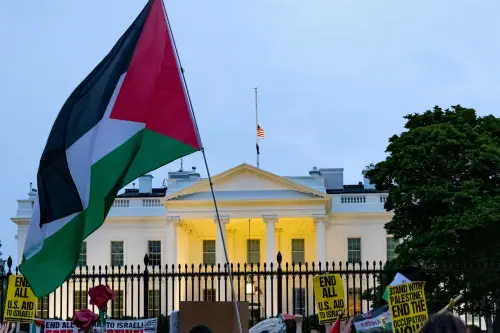
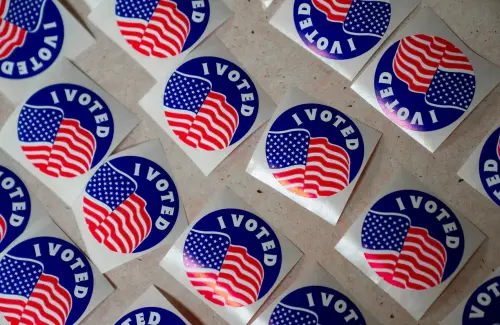
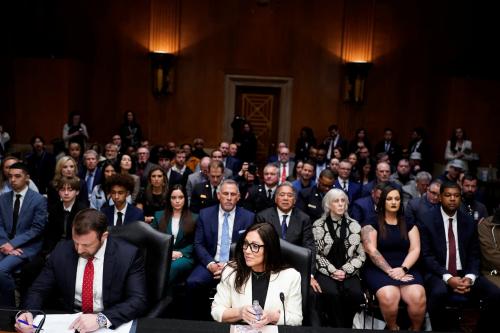

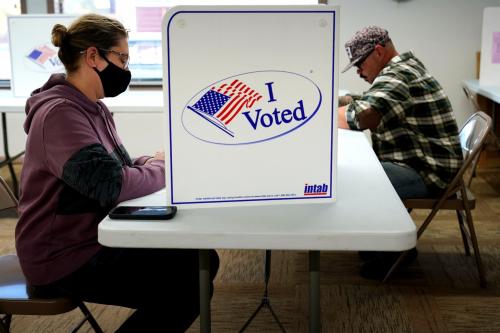
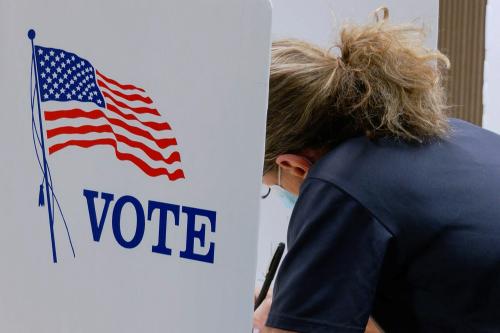

Commentary
Louisiana raises the stakes in the state abortion wars
May 8, 2025